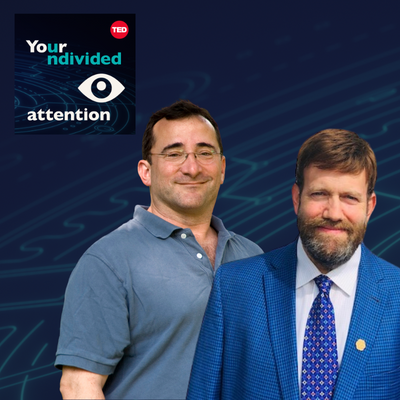Episode 53 | Jun 2, 2022
How Political Language Is Engineered with Drew Westen & Frank Luntz
Democracy depends on our ability to choose our political views. But the language we use to talk about political issues is deliberately designed to be divisive, and can produce up to a 15-point difference in what we think about those issues. As a result, are we choosing our views, or is our language choosing them for us?
This week, Your Undivided Attention welcomes two Jedi Masters of political communication. Drew Westen is a political psychologist and messaging consultant based at Emory university, who has advised the Democratic Party. Frank Luntz is a political and communications consultant, pollster, and pundit, who has advised the Republican Party. In the past, our guests have used their messaging expertise in ways that increased partisanship. For example, Luntz advocated for the use of the term “death tax” instead of “estate tax,” and “climate change” instead of “global warming.” Still, Luntz and Westen are uniquely positioned to help us decode the divisive power of language — and explore how we might design language that unifies.
CORRECTIONS: in the episode, Tristan refers to a panel Drew Westen and Frank Luntz were on at the New York Public Library. He says the panel was “about 10 years ago,” but it was actually 15 years ago in 2007. Also, Westen refers to a news anchor who moderated a debate between George H. W. Bush and Michael Dukakis in 1988. Drew mistakenly names the anchor as Bernard Kalb, when it was actually Bernard Shaw.
Major Takeaways
Differences in language can produce a significant difference in public opinion. For example, there’s a 15-point difference between extending versus expanding health insurance — with extending rating 15 points higher.
In general, Drew Westen and Frank Luntz advocate for simpler, humanizing language. For example, Westen advocates for shifting from the unemployed to people who've lost their jobs through no fault of their own, and from the underemployed to people who need two or three jobs to put food on the table. Similarly, Luntz advocates for shifting from transparency to accountability, because accountability is more broadly understood and valued.
We're all becoming political messaging strategists. Historically, messaging strategists like Westen and Luntz used special tools to test language, like focus groups and MRI scanners. Today, we can all use social media to A/B test the language that will steer public opinion in our desired direction.
Awareness can be an inoculant. By becoming more aware of how language influences our political views, we can be more immune to language engineered to influence us, and gain greater sovereignty over our minds.
Other recommended reading
The Political Brain: The Role of Emotion in Deciding the Fate of the Nation
Drew Westen's 2008 book about role of emotion in determining the political life of the nation, which influenced campaigns and elections around the world
Words That Work: It's Not What You Say, It's What People Hear
Frank Luntz's 2008 book, which offers a behind-the-scenes look at how the tactical use of words and phrases affects what we buy, who we vote for, and even what we believe in
New York Public Library's Panel on Political Language
A 2007 panel between multiple 'Jedi Masters' of political communication along the political spectrum, including Frank Luntz, Drew Westen, and George Lakoff



